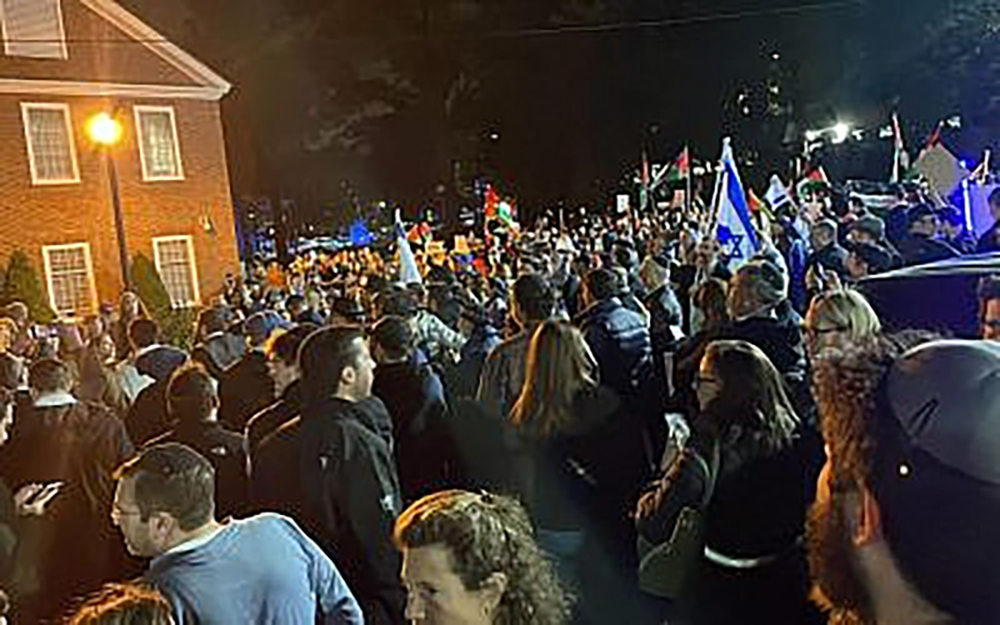
In a time when moral clarity should guide us, condemning Hamas for its savage and unprovoked attack on October 7, 2023, wasn’t just necessary—it was a moral imperative. The brutality of that day continues to be met with denial, justification, blame and silence. Instead of the solidarity it demands, condemnation of Hamas has been met with unsettling silence and, in some cases, outright criticism. This chilling reaction reveals a harsh truth: Standing up against such evil, even when it’s the right thing to do, can lead to profound isolation and betrayal.
For Teaneck, this condemnation was especially important. Our town, home to a significant Jewish population with strong ties to Israel, felt the horror of October 7 deeply. This wasn’t a political statement—it was a moral necessity, a stand that had been taken in many other places as well. By condemning the attack, we sought to affirm our unwavering support for the Jewish community, acknowledge the trauma faced by our residents, and stand firmly with our democratic allies and against the antisemitism that fueled such violence. While a council of seven voted unanimously “yes,” I, Councilwoman Hillary Goldberg, was the author, and my left-leaning world got very silent.
In the aftermath, the pain was both personal and profound. My story is the same as so many feeling politically homeless post-October 7. Instead of support, I received messages from people I believed to be friends—people I had stood with, believing we shared common values. Some even went as far as to send me propaganda-filled articles that questioned whether the atrocities even happened, casting doubt on the horrors we all knew were real, because Hamas proudly broadcast their crimes to the world.
These weren’t just disagreements; they were deeply personal affronts, challenging my identity as a Jew and as a leader in a community that values justice and solidarity. It felt as though the ground had shifted beneath me, leaving me to question the very foundations of the alliances I had trusted.
What was most hurtful wasn’t just the dismissals, but the outright accusations. I was told that focusing on the Jewish victims was unfair, that I was somehow biased for standing up for my own community in a moment of such raw vulnerability. It was as if the pain of my people was being weighed and found wanting, as if Jewish suffering didn’t merit the same compassion or urgency as others.
This wasn’t just an intellectual disagreement—it was a betrayal of everything I thought we stood for together, a betrayal by voices that had once risen up in solidarity.
These were not abstract betrayals; they were deeply personal, coming from those I had trusted and stood with on so many other issues. The refusal to acknowledge the specific targeting of Jews and the horror inflicted on my community, revealed a chilling indifference—a willingness to turn away when we needed support the most. One town cannot stand divided in such moments, and yet the silence was deafening.
The same voices that showed indifference toward rising antisemitism are often the loudest in condemning Trump as a threat to democracy. I see every day the social media posts about why they’re voting against Trump, and the dangerous threat Project 2025 poses to our democratic republic. And they’re right—Trump’s attacks on institutions, his hateful rhetoric and his flirtations with authoritarianism are a risk to the Democratic values we love and value. But it’s hypocritical to condemn one threat while ignoring another. When they support candidates who back pro-Hamas protests or that embrace “From the River to the Sea” type rhetoric, they are endorsing the same kind of hate and divisiveness that Trump represents. This isn’t neutrality—it’s complicity.
Hamas’ ideology is rooted in violent extremism, and its actions—targeting civilians, spreading terror and fostering hatred—are clear attacks on democratic principles and the dignity of human life. Despite this, some have downplayed these horrors, framing the conflict as a simple matter of “both sides” or advocating for ceasefires without condemning Hamas’ brutality or demanding the release of the hostages kidnapped on October 7, making claims that the protests are peaceful marches for civil rights, or that the hateful words chanted at them don’t mean what Jews say they mean. The normalization of Hamas supporters within political spaces mirrors this dangerous trend—a willingness to excuse or downplay violence and hate for the sake of political expediency.
It’s a stark reminder that our choices at the ballot box are more crucial than ever. Votes are earned, not assumed. Whether it’s in the local City Council races or in the race for the presidency, we need leaders who will stand firmly against hate and who will prioritize moral clarity over political expediency. We need leaders who will do what’s right, not what’s easy.
This election is not just about policies and platforms; it’s about choosing leaders who understand the importance of standing up against hate, out loud, regardless of the political cost. It’s about ensuring that the Jewish community’s pain and fear are recognized and addressed, because never is really now. As November draws closer, we must remember the lessons of this painful period and make choices that reflect our commitment to justice, solidarity and unwavering moral clarity.
In a world where standing up for justice can feel isolating, the true test lies in our ability to uphold our values despite the silence and betrayal we may face. As we rise up against hate and move forward together this November, make your voices heard, make the candidates earn your vote. Martin Luther King Jr. said it perfectly: “In the end, we will remember not the words of our enemies, but the silence of our friends.”
Hillary Goldberg is a member of the Teaneck Town Council.










